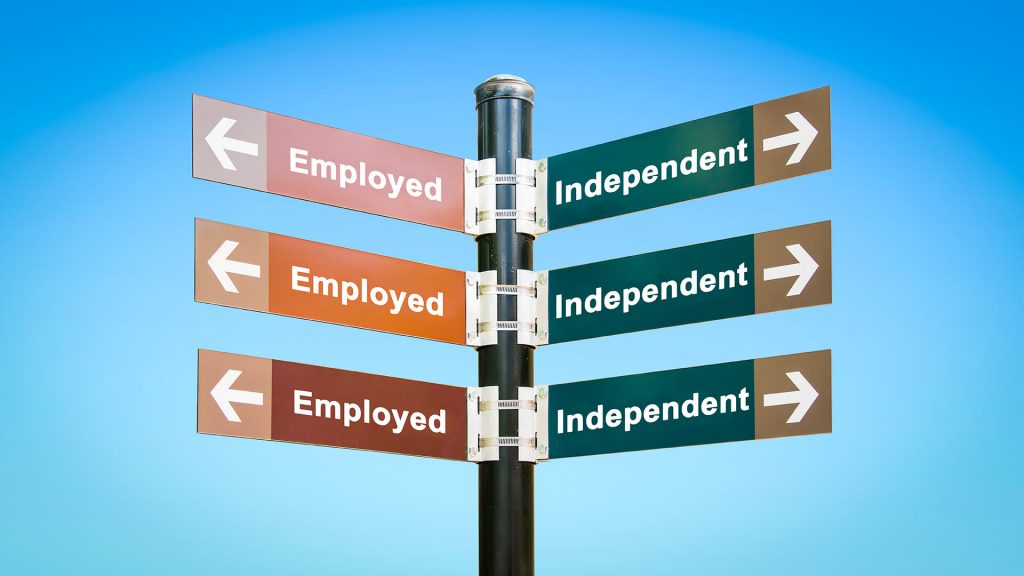Working as an independent contractor can be a rewarding and satisfying career option. It is important to understand the roles and responsibilities of everyone involved with any working relationship.
While your career services office can provide general guidance on working as an independent contractor, this area of employment law is complicated, and laws vary by state; questions about specific situations should be addressed to legal counsel. Before signing any agreement with a company or organization, you should fully understand the terms of the contract.
FREQUENTLY ASKED QUESTIONS
Question: What would my employment status be as an independent contractor?
Answer: There is a fundamental difference between being employed on a full-time regular basis by an employer and engaging in an independent contractor relationship.
A typical full-time employment relationship includes being placed on the employer’s payroll in which income earned is subject to taxes and the employer withholds those taxes from the employee’s paycheck. All income earned during the course of a calendar/tax year is reported by the employer to the employee and to the government on the form W-2. In addition, employees may be entitled to other benefits of employment, such as health insurance, vacation and sick time, and so forth.
There are two scenarios in which a company may form a relationship with an independent contractor: 1) The company may work directly with the contractor to negotiate and sign terms for work and pay; or 2) a company may hire a contractor through a third party. Either way, independent contractors are effectively self-employed.
Independent contractors should enter into a contracted agreement to provide services to a client in exchange for a fee (lump sum, hourly, weekly, monthly, piecemeal, per assignment, or some other arrangement). Independent contractors are not placed on an employer’s payroll; instead, the independent contractor typically invoices the client for work performed, and the client pays the independent contractor directly. The client does not withhold taxes from the payment, and the independent contractor is responsible for satisfying all tax obligations. All income earned during the course of a calendar/tax year is reported to the independent contractor and to the federal government by the client on Form 1099.
Most organizations are careful to distinguish independent contractors from employees. The federal government has adopted common law principles to determine an independent contractor relationship for federal income tax purposes. (Please refer to “Relationships Between Workers and Hiring Organizations” to determine the difference.) Courts in different jurisdictions may apply different tests for making the determination between contractor and employee, and there may also be local and state tax considerations.
Question: Who might I work for as an independent contractor?
Answer: Many organizations, large and small, engage the services of independent contractors. You’ll find that independent contractors work in a wide variety of industries, such as consumer products, transportation, technology, manufacturing, real estate, journalism, education abroad, and so forth. The “gig” economy is growing and is defined as a “labor market characterized by the prevalence of short-term contracts or freelance work as opposed to permanent jobs.”
Question: How will I be paid?
Answer: Organizations typically disclose the terms and conditions of payment through a written agreement directly with the independent contractor. The agreement should describe how and when payment will be made. The payment terms should be spelled out clearly in writing and agreed to by all parties before work is performed. The agreement should also explain how payment disputes may be settled. (Note: Generally, any dispute involving payment would be resolved either independently or through potential litigation to collect amounts that are due.)
Before signing any agreement, you should fully understand all of the terms and conditions of the contract. Your career services office may be helpful in understanding an agreement. However, consultation with an attorney may be necessary for full understanding of a contract.
Question: Are independent contractors eligible for benefits offered by an employer to its employees?
Answer: Independent contractors are generally not eligible for benefits the client makes available to its employees. Independent contractors are responsible for their own benefits such as health insurance and retirement benefits. Independent contractors are also required to pay all taxes associated with the 1099 payments made to them by the client.
Question: Are there risks and responsibilities associated with being an independent contractor rather than an employee?
Answer: The independent contractor generally assumes all responsibility for tax obligations, acquire their own benefits, manage billing and collections, maintain appropriate licensing and insurance, and accept legal responsibilities and exposure associated with performing the job.
Question: Am I protected by the same employment laws as an employee?
Answer: In general, independent contractors are not protected by employment laws since they are self-employed, depending on the state where the contractor performs its services. For example, laws that provide for a safe work environment that is free from health risks, harassment, or discrimination protect the rights of employees but may exclude independent contractors depending on state specific laws and regulations. This underscores the critical importance of a written agreement that spells out how the relationship will function, what the expectations are on both sides, and how payment and work performance will be handled. Claims for workers’ compensation are also generally available only to employees, so if you are injured at work you may be prohibited from filing such a claim.
Question:What kind of investment might I be expected to make?
Answer: Independent contractors who sell the products and/or services of a client will likely be required to learn the client’s product and/or services. This may involve an investment by the independent contractor both in time and expense. The time investment may include taking weeks or months to be trained in product knowledge, and this time may be without income, depending on the terms of the contract.
Some positions require independent contractors to purchase goods and/or services, which the contractor then sells to customers. (It is important to understand up front if unsold inventory can be returned after a specific period of time or if the independent contractor assumes the loss. This should be stipulated in the agreement.) The independent contractor may also be expected to incur other related expenses, such as securing licensing, where applicable.
Be wary of arrangements where compensation is based on recruiting others to sell products rather than on your ability to provide goods and services to a customer. Fully understand any training or support fees prior to signing any contract.
Question: What if a client is unhappy with the quality of my work or the products or services we are selling?
Answer: The independent contractor is usually accountable for satisfying specific performance expectations, including delivering customer service. Your agreement as an independent contractor should clearly define how you should handle any customer-related complaints, e.g., returning defective products, doing a job over, and so forth.
Question: What do I do if a client wants me to sign an agreement immediately?
Answer: As with any agreement, if someone does not want to give you adequate time to think it over or consult with others, you should proceed with caution. Ask for more time to consider the opportunity and to discuss it with a trusted professional before you sign any documents. Your career services office may be helpful in understanding an agreement. However, consultation with an attorney may be necessary for a full understanding of a contract.
Question:If I am an international student, what should I be aware of?
Answer: Be cautious. Check with your career center, office of international affairs resources first and, perhaps, an immigration attorney. Know your work authorization status and be transparent when working with the employer in securing the needed documents in a timely manner.
Reviewed and revised by the 2020 Principles for Ethical Professional Practice Committee.


